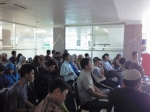ITB Team Won the First Place at the UGM Scientific Paper Competition for Their Peatland Fire Prediction System
By Adi Permana
Editor Adi Permana

BANDUNG, itb.ac.id — UTM Team from Institut Teknologi Bandung (ITB) have won the first place at the LOGIN 2022 competition. The team consisted of three students from Geodesy and Geomatics Undergraduate Program, Cokro Santoso, Kurnia Putri Adillah, and Ismail Al Faruqi.
LOGIN is a national scientific paper competition and a part of the Mercator 2020 event which was held by the Student Association of Geodetic Engineering Universitas Gadjah Mada (KTMG UGM). The competition was held from 20 December 2021 to 17 April 2022 and raised the theme Optimizing Geospatial Utilization in Indonesia's Sustainable Development in the VUCA era.

The UTM team chose peatland fire prediction method as their scientific paper topic. Ismail explained that Indonesia has the second-largest peatland area in the world. However, it has significantly decreased since 2016. According to data from the Ministry of Environment and Forestry, we have lost a total of 1.64 million hectares of forest area, of which 0.49 million hectares are from the peatland area. "Tackling the deforestation rate of the peatland area is something that we need to overcome", said Ismail. The team essay, Future Climate Data Integration with Remote Sensing for Peatland Fire Prediction in Indonesia by Utilizing Cloud-Computing-based Machine Learning, was created to help answer this problem.

The Peatland area has important but often overlooked roles in our life. Four major roles of peatland area include climate change mitigation, flood and drought mitigation, the economic source for many people, and the habitat for many endangered species which can only be found in the peatland ecosystem.
"Some peatland area recovery programs have been carried out, but according to a report from Peatland Watch Indonesia, the recovery targets tend to decrease from 2016 to 2020. This can happen because the restoration model that was applied may not be appropriate for fire-prone areas.
Ismail then said weather and climate are strong factors in influencing peatland fire. "So, in developing a peatland fire prediction model, it is important to complement it with the ability to predict the locations for possible hotspots," he said.
This scientific work is expected to provide comprehensive information on the spatial prediction pattern of peatland fire in Indonesia in the long term. By preventing or reducing peatland fire, we contribute directly to mitigating the climate crisis.
The team said that their motivation to take part in this competition is because there are a lot of participants, which the team considered a particular appeal. The team also said that they encountered some obstacles during their long preparation time. "The most difficult obstacle that we encountered is managing our time. In the sixth semester our schedule is filled with scientific reports, weekly tasks, and field study which almost left us with no time to do this research," said Cokro.
During the scientific paper presentation, the team was in Seribu Islands on a hydrograph excursion field study. The competition became more difficult because it coincided with their field study. "One of our most remarkable experiences in this competition is when we were on a field study in Seribu Island when we presented our paper in the final stage. After our presentation was done, we hastily ran into the boat because we almost got left behind by the group," said Kurnia.

Even though the team was on a field study, they prepared everything from the presentation materials to the presentation method beforehand. "We felt very happy because we have never won first place before, we feel proud because we managed to go through all of this together," said Cokro.
They also expressed deep gratitude to their lecturer and mentor, Anjar Dimara Sakti, S.T., M.Sc. from the Faculty of Earth Sciences and Technology, who has supervised them through this competition. Their thanks also go to their friends and colleagues in IMG, and to the academic community of Geodesy and Geomatics Engineering who have provided them with help and critics.
Reporter: Kevin Agriva Ginting (Teknik Geodesi dan Geomatika, 2020)
Translator: Favian Aldilla Rachmadi (Civil Engineering, 2019)

.jpg)
.jpg)
.jpg)
.jpg)
.jpg)



